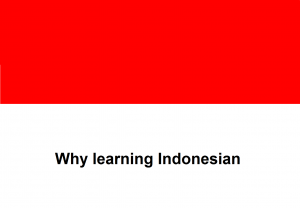Difference between revisions of "Language/Indonesian/Grammar/Why-Learn-Indonesian"
< Language | Indonesian | Grammar
Jump to navigation
Jump to search
| Line 1: | Line 1: | ||
[[File:Why learning Indonesian.png|alt=Why learning Indonesian|thumb|Why learning Indonesian]] | [[File:Why learning Indonesian.png|alt=Why learning Indonesian|thumb|Why learning Indonesian]] | ||
Hello everybody, | Hello everybody, | ||
| Line 6: | Line 5: | ||
In today's lesson you will discover '''¨WHY LEARNING INDONESIAN¨'''. | In today's lesson you will discover '''¨WHY LEARNING INDONESIAN¨'''. | ||
If You think that Indonesian language is so difficult, you are wrong. | |||
Indonesian is so easy for talking and easy for studying in common conversation. | |||
. | We do not use tenses like past, present, future, etc. | ||
We use the same structure. We just need adverb, like now, tomorrow, yesterday, etc. | |||
== '''Why learning Indonesian''' == | == '''Why learning Indonesian''' == | ||
Revision as of 13:29, 6 May 2021
Hello everybody,
In today's lesson you will discover ¨WHY LEARNING INDONESIAN¨.
If You think that Indonesian language is so difficult, you are wrong.
Indonesian is so easy for talking and easy for studying in common conversation.
We do not use tenses like past, present, future, etc.
We use the same structure. We just need adverb, like now, tomorrow, yesterday, etc.
Why learning Indonesian
| ENGLISH | INDONESIAN | PRONUNCIATION IN
ENGLISH |
BRAZILIAN
PORTUGUESE |
| I eat the bread | Saya makan roti | sah yah mah kahn roh tih | Eu como pão |
| I ate the bread (yesterday) | Saya makan roti (kemarin) | sah yah mah kahn roh tih (keh mah rihn) | Eu comi pão (ontem) |
| I will eat the bread (tomorow) | Saya akan makan roti (besok) | sah yah ah kahn mah kahn roh tih (beh sohk) | Eu vou comer pão (amanhã) |
Example
- I eat the bread -> saya makan roti
- I ate the bread (yesterday) -> saya makan roti (kemarin)
- I will eat the bread (tomorow) ->saya akan makan roti (besok)
